First Children’s Institute Town Hall Tackles Industry Problems and Solutions
- By Liz Button
At the American Booksellers Association’s very first Children’s Institute Town Hall on Thursday, June 27, booksellers discussed the prospect of ABA developing more specific education for different types of stores, such as micro-stores, nonprofits, and hybrid stores; the Trump administration’s proposed tariffs on Chinese goods; Baker and Taylor’s recent decision to stop serving the retail book market; and the way children’s books are perceived in the public eye as well as by publishers, among many other topics.
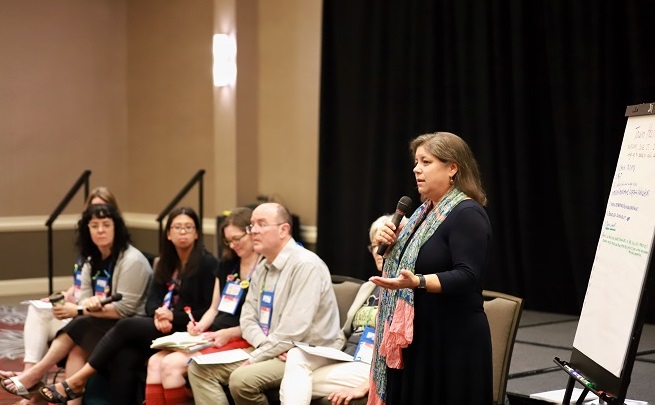
The event at the seventh annual Children’s Institute (Ci7) in Pittsburgh, Pennsylvania, provided booksellers with the opportunity to share ideas with ABA Board members and staff in a less formal setting, and to express their opinions and concerns about industry and association issues. ABA had previously only ever hosted bookseller Town Halls at Winter Institute and BookExpo, but chose Ci7 in Pittsburgh to host one for the first time at Children’s Institute.
ABA Board President Jamie Fiocco of Flyleaf Books in Chapel Hill, North Carolina, facilitated the meeting, and members of the ABA Board responded to questions and comments from booksellers. These included Kris Kleindienst of Left Bank Books in St. Louis, Missouri; Christine Onorati of WORD Bookstores in Brooklyn, New York, and Jersey City, New Jersey; Jenny Cohen of Waucoma Bookstore in Hood River, Oregon; Tegan Tigani of Queen Anne Book Company in Seattle, Washington; Kenny Brechner of Devaney, Doak & Garrett in Farmington, Maine; and Kelly Estep of Carmichael’s Bookstore in Louisville, Kentucky.
Fiocco started off the afternoon’s conversation by addressing a few of the topics booksellers had suggested earlier in the day via a flipchart stationed near the Ask ABA desk. First, she described going to Washington, D.C., with ABA Senior Strategy Officer Dan Cullen to testify before the Office of U.S. Trade Representatives in opposition to the proposed U.S. tariffs on Chinese goods, which would include printed books. Also testifying at the hearing were representatives from publishers, including Workman, and the Association of American Publishers (AAP) and other book industry players.
“You don’t get any reading from that group, so we’ll find out, quite honestly, from the administration whether they’re going to place tariffs on books or not,” said Fiocco, who thanked ABA Director of ABFE, Advocacy and Public Policy David Grogan for helping her prepare her testimony. “Obviously, it’s a really big deal. We’ve done what we can, so fingers crossed.”
Another topic suggested by booksellers was Baker & Taylor’s announcement in May that it would be ending all service to book retailers. The publishing industry reacted swiftly in the wake of the news with special offers targeted at the affected indies, and the association is continuing to work with publishers and other industry groups to address booksellers’ new distribution needs. All of these new publisher offers are available on a special page in ABA’s Book Buyers Handbook.
“We do feel like we have an option for rapid replenishment through the holiday season 2019,” Fiocco told booksellers. “We’ve got our publisher partners that are really jumping on it and understanding the vital need for West Coast stores to have rapid replenishment in 2019 and beyond.”
Fiocco encouraged booksellers who have lost their B&T e-commerce websites to reach out to ABA’s IndieCommerce team to learn about a special deal on IndieLite, the scaled-down and less expensive version of ABA’s e-commerce platform. For those who have lost B&T as a supplier and have concerns, Fiocco recommended contacting ABA’s Member Relationship Managers, Daniel O’Brien and Liz Roberts.
The next item on booksellers’ list of suggested topics was the rising minimum wage in a number of states and cities, a topic that falls into the category of store margins, Fiocco said, “because those of us who are in states or areas where the minimum wage is not being raised, [the issue that affects margins] is our occupancy; it’s our rent.”
Fiocco asked those booksellers who are decision-makers in their stores to be sure they are reporting their stores’ financial data to ABACUS, ABA’s confidential bookstore financial survey; the deadline to fill out this year’s survey has been extended to Friday, July 12.
“If you’re not the person who can greenlight ABACUS for your store, please ask if your store is doing it, because if we don’t have this data, we can’t illustrate to publishers where we need their help,” said Fiocco. “The more data we get, the more ways we can slice and dice it. We can talk about non-traditional store formats, we can talk about micro-stores, we can talk about all different sorts of things. We do have a critical mass of data, but we need to expand it. There are around 300 reporting stores, but we’d like to double that.”
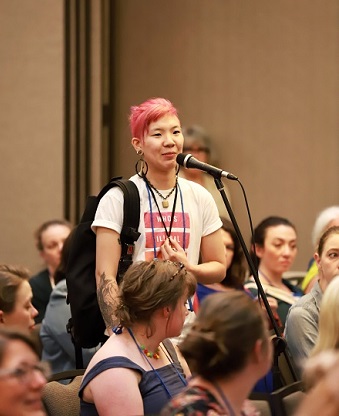
The first bookseller to take the mic after Fiocco’s initial comments was Avery Peregrine of Third Place Books, located in the Seattle area, who urged the Board to recognize at the start of industry gatherings that the events are occurring on Native lands, and to acknowledge the painful history of this country. Fiocco thanked Peregrine for the reminder and noted that the association made a special effort to do exactly this at the 2019 Winter Institute in Albuquerque.
In their comments, Peregrine also encouraged the board to keep talking to publishers to seek better terms and discounts for booksellers, and to continue coming up with ways to enhance bookstore sustainability.
In booksellers’ goal to achieve that sustainability, Fiocco said, they should first and foremost report their financial data to ABACUS but also emphasize the health and vitality of indie bookstores to their customers and let ABA staff know the specific sort of help or education they need.
“As a group, we need to identify to the board and the staff what we need, and we have to think about what we can personally do to raise the profile of bookselling,” said Fiocco. “As a board, we try to brainstorm how to direct staff to use the resources that we have to work with our partners, to work with our publishers, to increase profitability, to increase our wages, and to pay our rent on time.”
“Let’s be creative and let’s be constructive,” she continued. “Report to ABACUS and fill out your education evaluations, and let staff know what kind of education you need. If you are a micro-store, tell ABA exactly what you need. Even if you don’t know what that is, say these are my problems, help me fix them.”
Onorati told the audience that while her job as a bookseller can feel hard, sort of like rolling a boulder up a hill, it is things like talking to publishers, using store data from ABACUS, and continuing to raise the profile of indie bookstores that help chip away at that boulder.
“Most importantly, we have to make sure that we are clear in what our industry really is and what our margins are,” said Onorati. “When we talk about raising the profile of independent booksellers — what we do and what our place in our communities are — that is something we have to just keep fighting for.”
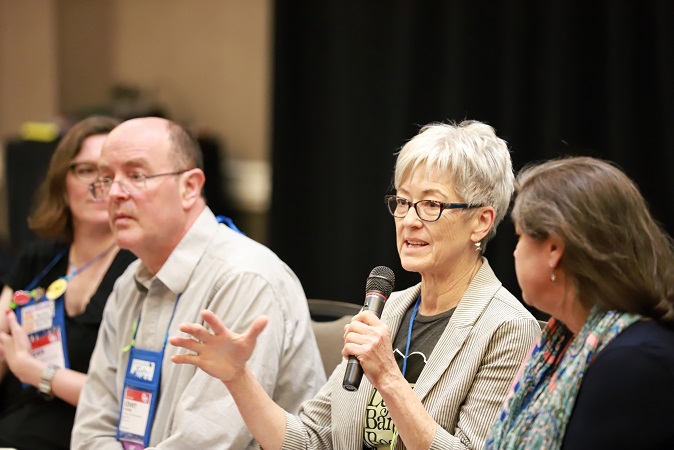
Kleindienst jumped in to emphasize how remarkable it is that indie booksellers have a trade association as active and engaged as ABA when it comes to serving their needs and identifying their concerns, but added that the ABA Board is made up of booksellers who share those very same needs and concerns.
“I’m so impressed with the work the board does every day and how dedicated the staff is,” said Kleindienst. “We share these concerns as a group, from owners to employees. We’re on it, but it takes everybody being engaged. We have so many resources here and it is a really tough job. I think everybody wants everybody in this room to not barely get by, but to actually have some kind of life.”
Annie Carl, who runs The Neverending Bookshop in Edmonds, Washington, told the board that as a business owner, she is a one-woman show who plays all the roles, from bookseller to accountant to buyer to marketing director, so she needs more education that will help not just the medium-sized stores, or even the small-to-medium stores, but stores that are even smaller than the businesses with four to five employees.
“I know there are a lot more micro-bookstores, and the education that is presented, I can’t use any of it for my store,” she said. “I order one copy of something in hardcover, maybe two, because that is what I can afford — those are my margins. I’m actually not buying books next month because I have to pay rent. We need this sort of education because the stuff that is working for the medium-to-big-sized stores is not working for people like me.”
Brechner agreed with Carl that more specifically targeted education, as well as panels that are curated with size in mind, are two things that may address the issue. “We need to be as mindful of this as we can and have multiple perspectives among the panelists in terms of the size of stores,” he said. “We try and think about that, but maybe we need to think about it more so that you have someone on there who can show you how to adapt the same topic.”
Estep said booksellers who run micro-stores should also think about some of the nontraditional ways there are to receive education through ABA, which includes IndieCommerce webinars and ABA’s online marketing and technology meetups. Said Estep, “We’re well aware that if you’re running the store by yourself, this [conference] may not be a place you can come because you’re running your store. So how can we reach you better and how can that education get to you in a way that is accessible to you and to stores that are that small?”
Veronica Liu of Word Up Community Bookstore in New York City also asked for more targeted education from ABA, this time around nonprofit bookstores, which, like micro-bookstores, have different issues from traditional stores. She is looking, she said, to “expand our reach to readers who wouldn’t otherwise have access to bookstores or don’t realize that they have access to bookstores…I know some booksellers here have either just started nonprofits or want to, or want to switch from one model to another. We’ve all been talking and we all want to share more information, so just giving us a space to do that [would be helpful].”
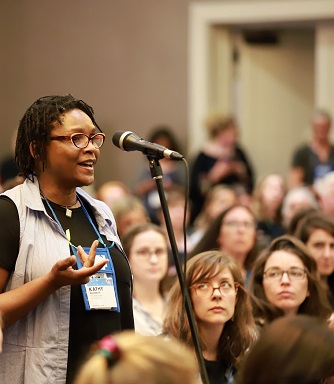
Other booksellers suggested targeted education, including Donna Wells of Politics and Prose in Washington, D.C., who agreed the association needs to consider more differentiation within the scope of its educational offerings and the way they are delivered as well as alternative venues for proposing solutions to challenges booksellers face. This, she said, would help booksellers address issues that are not as broadly felt across the industry. Additionally, Kelsy April of Savoy Bookshop and Café in Westerly, Rhode Island, suggested targeted education for hybrid bookstore-cafés, bars, and restaurants.
Kathy Burnette, owner of The Brain Lair in South Bend, Indiana, stood up next to say that, as the sole employee of her store, she had to close for a couple of days in order to attend Ci7. Burnette suggested IndieCommerce as one place where ABA could alleviate stress for micro-bookstores.
“I have IndieCommerce and the price of that monthly right there is kind of prohibitive for me to continue,” she said. “I have to keep looking at that because we’re small and we can’t buy as many items, so we do smaller margins and we’re limited in what we can do, but it would be helpful if I could afford to have IndieCommerce.”
Given the difficulty of running an entire bookstore without help, she asked the association to look into a sliding scale for booksellers who feel like IndieLite would not necessarily fulfill their store’s particular needs, but still want to stay competitive and viable by having an online shop.
Susan Kusel of [words] Bookstore in Maplewood, New Jersey, then brought the conversation back to children’s books, explaining to the board her sense that “children’s books is like the ugly stepchild,” as she put it.
“We do all these amazing things for adult books — if I look in PW, all the deals are for adult books; if I look in the New York Times, it’s all about adult books; if we have a conference or event, there are 20 tables for adult stuff…everywhere there is the same example over and over and over,” she said. “I would love to talk about having more roundtables and education to raise the profile of children’s bookselling as an industry in libraries, in bookstores, with publishers, and with all of us.”
Tigani, one of the board’s two newest members, told Kusel that as a children’s book buyer on the board, she also wants to do what she can to raise the profile of children’s bookselling.
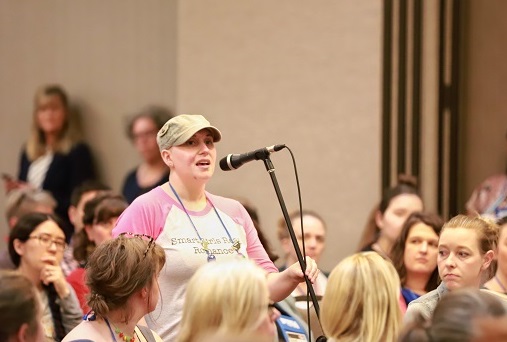
“I’m super proud to be a children’s book buyer on the board, and I think this really speaks to the fact that we think you guys in this room are important,” said Tigani. “It’s also important that we keep doing these town halls at Children’s Institutes.”
Next, Denise Philips of Gathering Volumes in Perrysburg, Ohio, asked booksellers in the room who run Dungeons and Dragons meetups at their stores to come talk with her afterward, and Desiree Bailey of San Marco Books and More in Jacksonville, Florida, asked the board to request that publishers provide more marketing graphics for social media.
“We’ve spent the last few years trying to grow our social media presence and increase our followers, and one of my biggest challenges has been coming up with my own graphics,” said Bailey. “I’m happy to take pictures, and I get creative, but there are all these rules that are constantly changing with the sizing of images, or how an image can only have 20 percent wording if it’s going to be boosted.”
Bailey told board members it would also help to have more book cover images that are pre-sized for Instagram and other social media platforms.
Finally, Sara Ornelas of Blue Baboon Books in Wichita, Kansas, asked for more education for booksellers who want to increase their involvement in book fairs. They’re her store’s bread and butter, she said, and she would like to make it easier to compete.
Ornelas encouraged the Board to convey to publishers the importance of making book fair books returnable and providing such logistical assistance as more fixtures, which would make setup easier.

